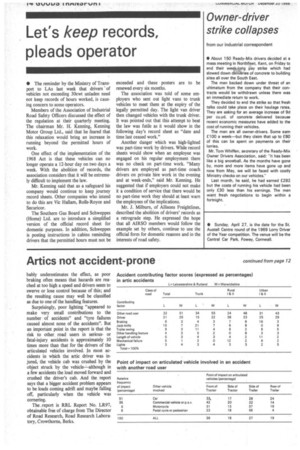Let's keep records,
Page 16

If you've noticed an error in this article please click here to report it so we can fix it.
pleads operator
• The reminder by the Ministry of Transport to LAs last week that drivers of vehicles not exceeding 30cwt unladen need not keep records of hours worked, is causing concern to some operators.
Members of the Association of Industrial Road Safety Officers discussed the effect of the regulation at their quarterly meeting. The chairman Mr. H. Kenning, Kenning Motor Group Ltd., said that he feared that this relaxation would bring an increase in running beyond the permitted hours of work.
One effect of the implementation of the 1968 Act is that these vehicles can no longer operate a 12-hour day on two days a week. With the abolition of records, the association considers that it will be extremely difficult to implement the law.
Mr. Kenning said that as a safeguard his company would continue to keep journey record sheets. Other companies who intend to do this are Vic Hallam, Rolls-Royce and Securicor.
The Southern Gas Board and Schweppes (Home) Ltd. are to introduce a simplified version of the official record sheet for domestic purposes. In addition, Schweppes is posting instructions in cabins reminding drivers that the permitted hours must not be exceeded and these posters are to be renewed every six months.
The association was told of some employers who sent out light vans to trunk vehicles to meet them at the expiry of the legally permitted day. The light van driver then changed vehicles with the trunk driver. It was pointed out that this attempt to beat the law was futile as it would show in the following day's record sheet as "date and time last ceased work."
Another danger which was high-lighted was part-time work by drivers. While record sheets would show when an employee was engaged on his regular employment there was no check on part-time work. "Many drivers are employed as part-time coach drivers on private hire work in the evening and at week-ends," said Mr. Kenning. He suggested that if employers could not make it a condition of service that there would be no part-time work they should at least warn the employees of the implications.
Mr. J. Milburn, of Allisons Freightlines, described the abolition of drivers' records as a retrograde step. He expressed the hope that all AIR SO members would follow the example set by others, continue to use the official form for domestic reasons and in the interests of road safety.


























































































